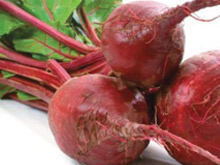 |
With winter fading, fresh veggies begin to be seen in the market. Green peas, beans, corn, and bell peppers of all colours, line the shelves. Plump red strawberries and fragrant pineapples are available in plenty.
|
We should always try to eat more local, seasonal food,
- to reduce the energy (and associated CO2 emissions) needed to grow and transport the food we eat
- to avoid paying a premium for food that is scarcer or has travelled a long way
- to support the local economy
- to reconnect with nature’s cycles and the passing of time
- because seasonal food is fresher and so tends to be tastier and more nutritious
Vegetable of the Month BEETROOT
Beetroot has long been considered beneficial to the blood, the heart, and the digestive system. It has been regarded as a laxative; a cure for bad breath, coughs and headaches; and even as an aphrodisiac. More recently, it has been advocated as a cancer preventative and as a means of bolstering the immune system. Beetroot is rich in many important minerals and micronutrients; it is a nutritious vegetable with many health-giving properties. The leaves of beetroot are rich in beta-carotene, calcium and iron. And can be eaten like spinach or any other leafy greens.
Raw beetroot, and the juice made from it, is high in carbohydrate, low in fat and is a good source of minerals, including sodium, phosphorous, magnesium, calcium, iron and potassium, and vitamins, including folic acid, niacin and vitamin C. It is rich in antioxidants like betalains. Beetroot juice is a popular component of an anti-cancer diet. It is also known as a cardio-tonic.
Beetroot’s beneficial effects on digestion may relieve other problems associated with the stagnation of food and food toxicity, such as skin problems, headaches and lethargy.
So try the beets this March – as salad, soup or juice – and at the end of the month, see a healthy glow on your face!
|
What’s in season in March?
Vegetables
beetroot, turnip, carrot, cabbage, cauliflower, broccoli, kohlrabi, spinach, corn, beans, peas, peppers
Fruits
banana, orange, kiwi fruit, pineapple, pomegranate, figs, strawberries |
|
 |
Sunita Pant Bansal, Senior Wellness Consultant for Apollo Life |
|